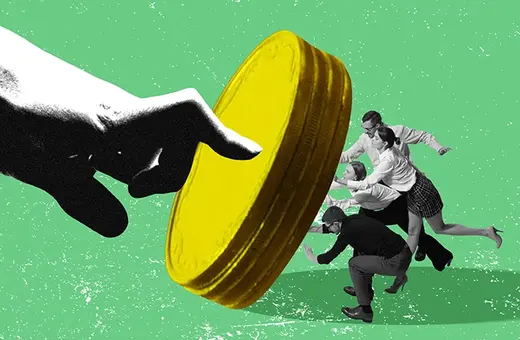Debt supposedly helps us take part in the free market, allowing us to buy homes and enjoy goods and services while driving prosperity. But debt is also taken on by many in order to survive, with ruinous consequences. The rational actor is a myth. Instead, Chrystin Ondersma proposes a new taxonomy of debt and argues for a dignity-based approach to eradicating the conditions that drive it.
Americans rely on debt for everything from homes, to cars, to educations, to medical care, but the perceptions and policies around debt are radically inadequate. Like many Americans, my parents believed that if they only took on “good debt” and avoided “bad debt” they’d be financially secure. But then my sister fell ill, insurance didn’t cover her treatment, and my family ended up losing their home in foreclosure and having to seek bankruptcy relief. My family is far from alone. Over a quarter of adult Americans have at least one debt in collections, and over 40% carry medical debt.
___
Our current household debt policies are rooted in myths rather than reality.
___
It’s unacceptable that a medical emergency means financial calamity and that a basic college education requires students to mortgage their futures. We desperately need a radical shift in U.S. debt policy.
Our current household debt policies are rooted in myths rather than reality: the myth of the strategic bankruptcy filer, the belief that borrowing leads to equality and prosperity, and the overarching myth of the rational actor in a free market all shape our policies, often to the detriment of marginalized communities. In truth, there is no such thing as a “free market:” our banking system could not function without government intervention, the government repeatedly intervenes to rescue financial institutions, and millions of (mostly white) American property owners can trace their wealth back to the Homestead Act or subsidized Federal Housing Administration loans (both of which excluded Black and other marginalized Americans).
Americans can’t be expected to borrow their way out of poverty and injustice. People in debt are not frivolous or foolish, they are surviving. Our leaders can’t just keep throwing credit at problems like financial distress and inequality, and then punishing people when they use that credit.
It's time for a reality-based taxonomy that can guide policymakers in discerning between harmful and potentially beneficial household debt; one I propose in my forthcoming book Dignity Not Debt: An Abolitionist Approach to Economic Justice. I root this new approach in the principle of human dignity rather than the myth of the free market, and offer a taxonomy with three intersecting and overlapping categories: survival debt, opportunity debt, and extractive debt.
Survival debt is debt that households incur to survive and achieve a standard of living consistent with human dignity, like medical debt, putting groceries on the credit card, unpaid utilities, or debt incurred to acquire an education sufficient to earn a living wage. Without this debt, you cannot survive.
Opportunity debt is debt that households incur to expand resources or opportunities, such as a home, car, washing machine, or debt incurred to acquire a non-tangible opportunity, such as an education, or a new experience like a vacation or a wedding. With this debt, your potential earnings and experiences expand.
There’s overlap, of course—I mentioned educational debt in both categories, for example.





















Join the conversation